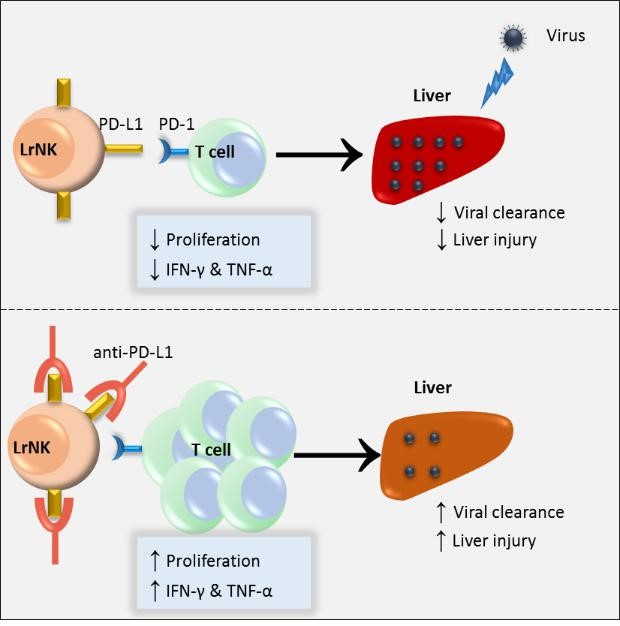LrNK Cells Can Maintain Liver Immune Tolerance
Recently, Immunity, a peer-reviewed medical journal of immunology published by Cell Press, published a research paper entitled with Liver-resident NK cells control antiviral activity of hepatic T cells via the PD-1 axis, which was jointly studied by the Department of Life Sciences and Medicine of USTC, the CAS Key Laboratory of Innate Immunity and Chronic Disease, and Academician TIAN Zhigang’s research group from Hefei National Laboratory for Physical Sciences at the Microscale. Their findings revealed that liver-resident NK cells can negatively regulate the antiviral immune response of T cells and its mechanisms.
The liver has a unique immune tolerance property and is the main site for many viruses to replicate in the body. Liver T cells often cannot produce an effective immune response to eliminate the virus and cause persistent infection of the virus. However, the regulatory mechanism of liver T cell antiviral ability is not very clear. Professor TIAN Zhigang's research group reported for the first time in 2013 that there was a unique group of LrNK (Liver-resident NK) cells in the liver of adult mice (J Clin Invest 123, 1444-1456 (2013)). Compared with the classical NK (cNK) cells in the peripheral circulation, this special LrNk cell of the liver has different regulation mechanisms of phenotypic development and differentiation, and the expression of effector molecules is also different. Moreover, LrNK cells are superior to cNK cells in expressing immunosuppressive and tolerance induction related genes. Given that liver immune tolerance is closely related to low T cell response, whether LrNK cells can maintain liver immune tolerance by regulating T cell responses has become an important starting point for this study.
Research group implemented experiments on LrNK-cell-deficient mice, and found that after virus infection of the defective mice, the T cells function in the liver of the mice was enhanced, and the virus titer was reduced. Exogenously transfected LrNK cells in normal mice or LrNK cell-deficient mice can inhibit the antiviral T cell response in the liver, and cNK cells can promote T cell responses. In vitro and in vivo experiments further revealed that LrNK cells rely on PD-L1 on their surface to exert functional inhibition of T cells in the liver. This article systematically expounds the completely opposite function of LrNK and cNK cells in regulating T cell response, suggesting that LrNK cells play an important role in the maintenance of the Liver immune tolerance microenvironment. This work provides a new basis for understanding the intrinsic link between the composition of NK cell subsets and the shaping of regional immune traits.

LrNK cells inhibit the function of hepatic T cells via PD-1-PD-L1 interactions.
This research was funded by the National Natural Science Foundation of China and the Chinese Academy of Sciences. Corresponding authors are Professor TIAN Zhigang and Associate Professor PENG Hui of USTC. The first author is Dr. ZHOU Jing of USTC.
Back
